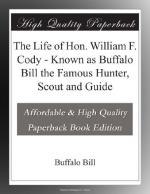In the spring of this year (1855) a pro-slavery party came to our house to search for father; not finding him, they departed, taking with them my pony, Prince. I shall never forget the man who stole that pony. He afterwards rose from the low level of a horse thief to the high dignity of a justice of the peace, and I think still lives at Kickapoo. The loss of my faithful pony nearly broke my heart and bankrupted me in business, as I had nothing to ride.
One day, soon afterwards, I met my old friend, Mr. Russell, to whom I related all my troubles, and his generous heart was touched by my story. “Billy, my boy,” said he, “cheer up, and come to Leavenworth, and I’ll employ you. I’ll give you twenty-five dollars a month to herd cattle.”
I accepted the offer, and heartily thanking him, hurried home to obtain mother’s consent. She refused to let me go, and all my pleading was in vain. Young as I was—being then only in my tenth year, my ideas and knowledge of the world, however, being far in advance of my age—I determined to run away from home. Mr. Russell’s offer of twenty-five dollars a month was a temptation which I could not resist. The remuneration for my services seemed very large to me, and I accordingly stole away and walked to Leavenworth.
Mr. Badger, one of Mr. Russell’s superintendents, immediately sent me out, mounted on a little gray mule, to herd cattle. I worked at this for two months, and then came into Leavenworth. I had not been home during all this time, but mother had learned from Mr. Russell where I was, and she no longer felt uneasy, as he had advised her to let me remain in his employ. He assured her that I was all right, and said that when the herd came in he would allow me to make a visit home.
Upon my arrival in Leavenworth with the herd of cattle, Mr. Russell instructed his book-keeper, Mr. Byers, to pay me my wages, amounting to fifty dollars. Byers gave me the sum all in half-dollar pieces. I put the bright silver coins into a sack, which I tied to my mule, and started home, thinking myself a millionaire. This money I gave to mother, who had already forgiven me for running away.
Thus began my service for the firm of Russell & Majors, afterwards Russell, Majors & Waddell, with whom I spent seven years of my life in different capacities—such as cavallard-driver, wagon-master, pony express rider and driver. I continued to work for Mr. Russell during the rest of the summer of 1855, and in the winter of 1855-56 I attended school.
Father, who still continued to secretly visit home, was anxious to have his children receive as much of an education as possible, under the adverse circumstances surrounding us, and he employed a teacher, Miss Jennie Lyons, to come to our house and teach. My mother was well educated—more so than my father—and it used to worry her a great deal because her children could not receive better educational advantages. However, the little school at home got along exceedingly well, and we all made rapid advances in our studies, as Miss Lyons was an excellent teacher. She afterwards married a gentleman named Hook, who became the first mayor of Cheyenne, where she now lives.




